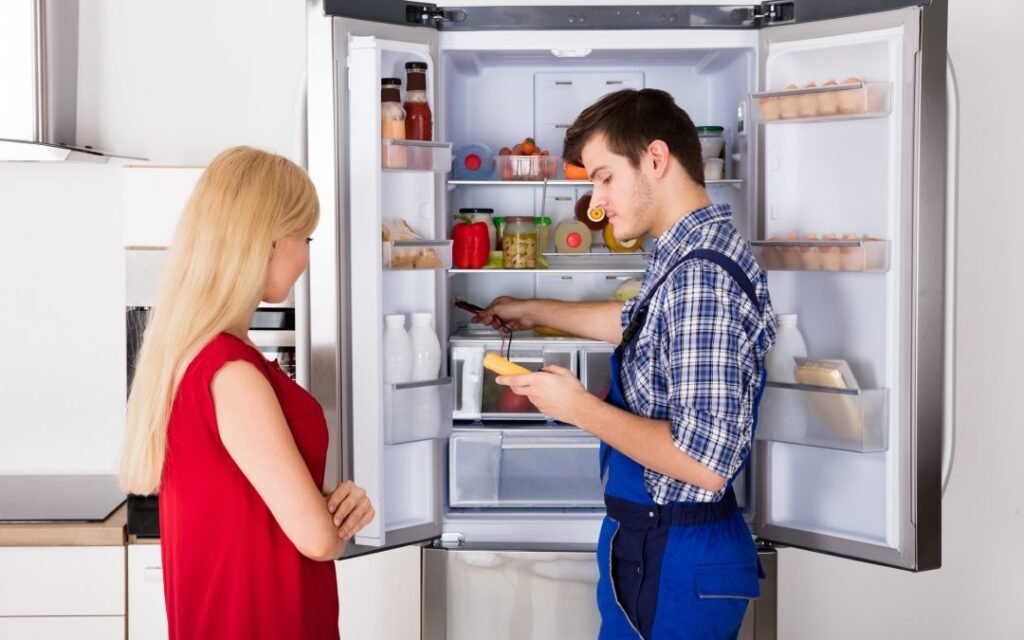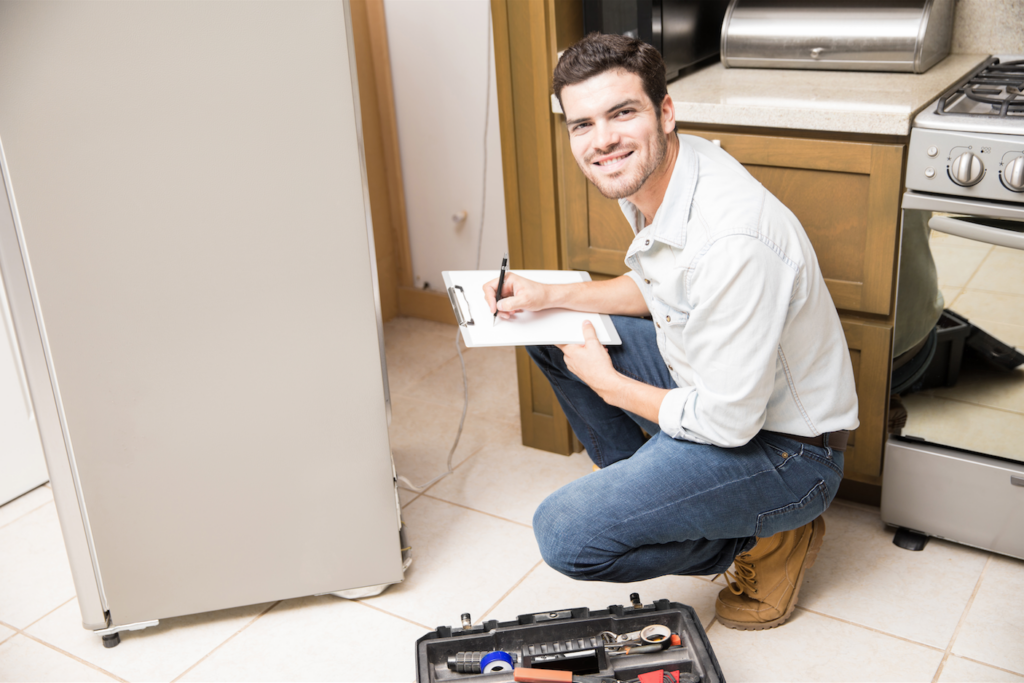
Is your refrigerator acting up? It can be quite frustrating when your food starts spoiling faster than usual or when you hear strange noises coming from your appliance. In this article, we will explore some common signs that indicate your refrigerator is in need of repair. Whether it’s a leaking fridge or a freezer that’s not freezing, knowing these signs can help you address the issue before it worsens. So, keep reading to become more informed about the telltale signs that your refrigerator may need some professional attention.
Common Signs of a Refrigerator in Need of Repair
Is your refrigerator showing signs of trouble? It’s important to pay attention to these warning signs and address them promptly to avoid further damage and costly repairs. In this article, we’ll explore the common signs that indicate your refrigerator needs repairing. From strange noises to faulty ice makers, we’ll cover it all. So, let’s dive in and learn more about these signs to ensure the longevity of your fridge.
1. Strange Noises
Your refrigerator shouldn’t make loud or unusual noises when functioning properly. If you notice any of the following sounds, it’s a good indication that something is wrong and requires attention.
1.1 Grinding or Rattling Noises
Grinding or rattling noises can indicate a problem with the fan motor, condenser coils, or compressor. These components may be loose, worn out, or damaged, causing the abnormal noise. It’s advisable to contact a professional technician to diagnose and fix the issue promptly before it worsens.
1.2 Buzzing or Humming Sounds
A gentle buzzing or humming sound is normal for most refrigerators as they cycle on and off to maintain the desired temperature. However, if you notice an unusually loud or continuous buzzing or humming noise, it could be a sign of a failing compressor or a problem with the condenser fan. Seeking professional assistance can help identify and resolve the issue.
1.3 Clicking or Ticking Noises
If you hear frequent clicking or ticking noises coming from your refrigerator, it may indicate a faulty start relay or a malfunctioning thermostat. These components are essential for proper cooling and may need to be replaced by a trained technician to ensure your fridge functions optimally.
1.4 Whistling or Squealing Sounds
Whistling or squealing sounds may indicate a problem with the evaporator fan motor or a malfunctioning defrost timer. The fan motor blades can become obstructed or worn out over time, leading to these distressing sounds. It’s crucial to address this issue promptly to prevent further damage and ensure your refrigerator runs smoothly.

This image is property of pittsburghappliancerepairs.com.
2. Leaking Water
Water leaks are another common sign that your refrigerator needs repair. If you notice any of the following water-related issues, it’s time to have your fridge inspected by a professional.
2.1 Water Pooling Inside the Fridge
If you find water pooling inside your refrigerator, it could be due to a clogged or frozen defrost drain. The defrost drain is responsible for directing excess moisture out of the fridge. When it gets blocked, water accumulates inside, causing leakage. A qualified technician can clean or unclog the defrost drain to resolve this issue.
2.2 Water Dripping from the Freezer
Water dripping from the freezer compartment is often associated with a blocked or frozen defrost drain tube. This drain tube carries melted ice from the freezer to the drip pan at the bottom of the refrigerator. When obstructed, water accumulates and eventually drips onto the floor or shelves. A professional can clear the blockage and prevent further leakage.
2.3 Water Leaking from the Bottom of the Fridge
If you notice water leaking from the bottom of your refrigerator, it may indicate a problem with the water line or a faulty water filter. Damaged or improperly connected water lines can cause leaks, while a worn-out water filter may not effectively prevent water from leaking. Consulting a technician is crucial to identify and resolve the underlying cause.
2.4 Water Dispenser Leakage
If your refrigerator is equipped with a water dispenser and you notice water leaking either from the dispenser or the surrounding area, there may be a problem with the water inlet valve or the dispenser housing. These components may need to be repaired or replaced by a professional to stop the leakage and ensure proper functionality.
3. Fridge Not Cooling
One of the most concerning signs of a refrigerator in need of repair is when it fails to cool properly. Here are some symptoms to look out for:
3.1 Warm or Room Temperature Interior
If the interior of your refrigerator feels warm or at room temperature, it’s a clear sign that something is wrong with the cooling system. This issue could be caused by a faulty thermostat, malfunctioning compressor, or inadequate refrigerant levels. Seeking professional help is crucial to diagnose and resolve the cooling problem promptly.
3.2 Food Spoiling Quickly
When your refrigerator isn’t cooling correctly, your food may spoil more quickly than usual. If you notice that perishable items such as dairy products, meats, or produce are spoiling before their expiration date, it’s an indication that your fridge isn’t maintaining the appropriate temperature. A professional technician can assess and rectify the cooling issue to prevent further food wastage.
3.3 Uneven Cooling Across Shelves
Do you find that some areas of your refrigerator are colder than others? Uneven cooling across shelves indicates an airflow problem, which could be caused by a malfunctioning fan or blocked vents. Proper circulation of cool air within the refrigerator is essential to maintain consistent temperatures. A technician can inspect and fix the air circulation issue to ensure your fridge cools uniformly.
3.4 Compressor Not Running
The compressor is the heart of the refrigerator’s cooling system. If you notice that the compressor is not running or continuously cycles on and off, it could signify a problem. This issue can be caused by a faulty relay, capacitor, or compressor motor. Seeking professional assistance is vital to accurately diagnose and replace the faulty components, if necessary.

This image is property of myfurnace.com.
4. Freezer Not Freezing
In addition to the refrigerator not cooling properly, a freezer that fails to freeze adequately can be a cause for concern. Look out for the following signs:
4.1 Soft or Melting Frozen Foods
If your frozen foods are soft, partially melted, or have icy surfaces, it’s likely that your freezer is not reaching the desired temperature. This could be due to a faulty thermostat, inadequate defrosting, or a malfunctioning compressor. It’s best to have a professional examine and repair the freezer to ensure your frozen items remain properly preserved.
4.2 Frosty or Icy Surface on Packages
When your freezer isn’t functioning correctly, you may notice excessive frost or ice forming on the surfaces of food packages. This indicates that the freezer is not maintaining a consistent and optimal temperature. The presence of frost or ice can be caused by various factors, such as a defective defrost heater, damaged door gaskets, or improper airflow. Engaging a technician can help identify and resolve the specific issue.
4.3 Excessive Frost Accumulation
While a certain amount of frost buildup inside the freezer is normal, excessive frost accumulation can be problematic. If you observe thick layers of frost on the freezer walls, shelves, or vents, it suggests a problem with the defrost system. This malfunction can lead to inefficient cooling and higher energy consumption. Seeking professional assistance can help address the defrost system issue and prevent further frost buildup.
4.4 Defrost Timer Failure
A faulty defrost timer can cause continuous freezer operation without periods of defrosting. This can result in excessive frost buildup and reduced cooling efficiency. If you notice that the defrost cycle is not occurring or that frost continues to accumulate, it’s advisable to have a technician inspect and replace the defrost timer if necessary.
5. Excessive Frost or Ice Build-Up
Excessive frost or ice buildup can occur not only in the freezer but also in other areas of your refrigerator. Keep an eye out for the following signs:
5.1 Frost or Ice on the Freezer Walls
If you notice the formation of frost or ice on the walls of your freezer, it may indicate a problem with the defrost system. This issue can disrupt the defrost cycle and lead to inadequate cooling. A technician can inspect and repair the defrost system components to prevent further frost accumulation.
5.2 Frost or Ice on Food Packages
When frost or ice starts to accumulate on your food packages, it indicates inconsistent cooling and poor airflow within the refrigerator. This problem can be caused by a malfunctioning fan or blocked vents, disrupting the proper circulation of cool air. It’s important to have a professional assess and resolve the cooling issue to prevent damage to your food items.
5.3 Ice Build-Up in the Drain Tube
The drain tube is responsible for guiding the melted ice from the defrost cycle out of the refrigerator. If the drain tube becomes obstructed or frozen, the water can back up and form ice inside the tube. This can lead to leaks and the accumulation of ice in the tube, preventing proper drainage. Seeking professional assistance is crucial to unclog or replace the drain tube and prevent further ice buildup.
5.4 Inadequate Defrost Timer
A malfunctioning or inadequate defrost timer can disrupt the defrost cycle, causing excessive frost or ice buildup. If you notice that the defrost cycle is not occurring, it’s important to have a technician inspect and replace the defrost timer if necessary. Maintaining a properly functioning defrost system is essential for efficient cooling and preventing frost-related issues.

This image is property of images.prismic.io.
6. Constant Cycling On and Off
A refrigerator that constantly cycles on and off can be a sign of an underlying problem. Look out for the following signs of rapid cycling:
6.1 Fridge Running Too Frequently
If you notice that your refrigerator is running more frequently than usual, it may indicate an issue with the cooling system. This could be caused by factors such as a malfunctioning thermostat, a dirty condenser coil, or an inadequate refrigerant charge. A professional technician can diagnose and address the problem to reduce excessive cycling and ensure efficient operation.
6.2 Fridge Turning On and Off Rapidly
Rapidly turning on and off in short intervals is known as short cycling and can be a symptom of compressor malfunction. Short cycling can lead to inadequate cooling, increased energy consumption, and premature wear and tear on the compressor. To prevent further damage, it’s crucial to consult a professional technician to assess and repair the compressor or other associated components.
6.3 Overloaded Compressor
The compressor is responsible for compressing the refrigerant and ensuring proper cooling within the refrigerator. If the compressor is overloaded, it may struggle to maintain the necessary pressure and cause the refrigerator to cycle constantly. Overloading can occur due to factors such as a dirty condenser coil, improper ventilation, or a refrigerant leak. Seeking professional help is essential to relieve and resolve the compressor overload issue.
6.4 Malfunctioning Thermostat
A malfunctioning thermostat can cause your refrigerator to cycle on and off erratically. This disruption in temperature regulation can result in inefficient cooling and inconsistent temperatures. It’s advisable to have a professional technician inspect and replace the faulty thermostat to mitigate the cycling issue and ensure proper cooling performance.
7. Inconsistent Temperature
Maintaining a consistent temperature within your refrigerator is crucial for food safety and preservation. Keep an eye out for the following signs of inconsistent temperatures:
7.1 Temperature Fluctuations
If you notice frequent temperature fluctuations within your refrigerator, it may indicate a problem with the temperature control settings or a failing thermostat. Fluctuating temperatures can put your perishable items at risk of spoilage and compromise food safety. A professional technician can assess and rectify the issue to ensure consistent cooling and temperature regulation.
7.2 Inaccurate Temperature Settings
Inaccurate temperature settings can lead to either insufficient cooling or overly cold conditions within your refrigerator. If you find that the temperature you have set isn’t matching the actual temperature inside, it may be due to a faulty temperature control panel or a malfunctioning thermostat. Having these components inspected and repaired by a professional is essential for accurate temperature regulation.
7.3 Damaged Temperature Sensors
Temperature sensors in your refrigerator help monitor and regulate the internal temperature. When these sensors become damaged or fail, they can provide inaccurate readings, leading to inconsistent cooling. A trained technician can diagnose and replace the faulty temperature sensors, ensuring accurate temperature regulation and preventing food spoilage or freezing.
7.4 Overcrowded Refrigerator
Believe it or not, overcrowding your refrigerator can also lead to inconsistent cooling. When there isn’t enough space for air circulation, the cool air cannot flow properly, resulting in uneven cooling within the fridge. It’s important to organize your fridge in a way that allows for optimal airflow, preventing temperature inconsistencies. Consider removing unnecessary items or decluttering to improve air circulation.

This image is property of areaappliancerepair.com.
8. Fridge Door Seal Problems
The door seal, also known as the door gasket, plays a crucial role in maintaining the temperature and preventing cool air from escaping. Look out for the following signs of door seal problems:
8.1 Loose or Damaged Door Gasket
If you feel cool air escaping or notice loose sections or tears in the door gasket, it’s a clear sign that the door seal needs attention. A damaged or deteriorated door gasket can allow warm air to enter the refrigerator, leading to inadequate cooling and increased energy consumption. Replacing the faulty door gasket is essential to maintain the efficiency of your refrigerator.
8.2 Difficulty in Opening or Closing the Door
Experiencing difficulty in opening or closing the refrigerator door may indicate problems with the door gasket or hinges. A damaged door gasket can make the door stick or require excessive force to open or close, causing inconvenience and potential damage to the gasket itself. A technician can assess and repair the door gasket or hinges to ensure smooth and effortless operation.
8.3 Cold Air Leaking from the Fridge
If you feel a draft or cold air escaping from your refrigerator when the door is closed, it suggests a problem with the door seal. A compromised door seal allows cool air to leak out, resulting in improper cooling and increased energy consumption. Seeking professional assistance is important to identify and address the door seal issue promptly.
8.4 Moisture or Condensation on the Door Seal
Moisture or condensation on the door seal can occur when warm air enters the refrigerator due to a faulty door gasket. This can lead to a buildup of moisture, which in turn can cause mold or mildew growth and compromise the effectiveness of the seal. A professional can inspect and replace the damaged door gasket to prevent further moisture-related issues.
10. Faulty Ice Makers
For those who rely on their refrigerator’s ice maker, a malfunctioning unit can be a frustrating problem. Look for the following signs of a faulty ice maker:
10.1 No Ice Production
If your ice maker stops producing ice altogether, it’s an obvious sign of a problem. This issue can be caused by a clogged water line, a defective water inlet valve, or a malfunctioning ice maker motor. A professional technician can diagnose and fix the ice maker to restore proper ice production.
10.2 Small or Irregular Ice Cubes
If your ice maker is producing smaller or irregularly shaped ice cubes than usual, it’s an indication of a problem. This issue can be caused by a faulty water supply, low water pressure, or a failing motor. Having a technician inspect and service the ice maker can help restore its functionality and provide properly formed ice cubes.
10.3 Ice Maker Overfilling
An ice maker that continuously overfills and spills ice into the freezer can be a messy and inconvenient problem. This can be caused by a faulty water inlet valve or a malfunctioning ice maker module. Seeking professional assistance is important to resolve the overfilling issue and prevent further damage to the ice maker and freezer.
10.4 Ice Maker Jammed or Stuck
If the ice maker becomes jammed or stuck, it can prevent proper ice production and dispensing. This issue can be caused by ice cubes getting lodged in the mechanism or a malfunctioning motor. Trying to fix a jammed ice maker yourself can cause additional damage, so it’s best to consult a professional technician to safely resolve the issue.
In conclusion, it’s crucial to be aware of the common signs that indicate your refrigerator needs repair. Whether it’s strange noises, leaking water, inadequate cooling, excessive frost, constant cycling, inconsistent temperature, door seal problems, or issues with the ice maker, promptly addressing these problems can help preserve the lifespan of your refrigerator and prevent costly repairs or replacements. Remember to consult a professional technician for accurate diagnosis and efficient repair to ensure the optimal performance of your refrigerator.

This image is property of miro.medium.com.






